
Matt Garman, CEO of Amazon Web Services - what is the future of big tech?
Simon Jack, the BBC’s business editor, speaks to Matt Garman, chief executive of Amazon Web Services - part of the retail giant Amazon, and the world’s largest cloud computing company.Mr Garman started his career at AWS as an intern, and has risen to oversee a global network of huge data centres, providing IT resources for businesses worldwide. In this conversation, he shares his vision for the future of big tech through cloud computing and artificial intelligence, and the potential for economic growth and opportunity he believes they hold.He also sets out his support for the role for nuclear technology in powering the data centres at that sit at the heart of big tech - and the risks of over-regulation, dismissing claims that the industry is uncompetitive and dominated by huge corporations such as his. The Interview brings you conversations with people shaping our world, from all over the world. The best interviews from the BBC. You can listen on the BBC World Service, Mondays and Wednesdays at 0700 GMT. Or you can listen to The Interview as a podcast, out twice a week on BBC Sounds, or wherever you get your podcasts.Presenter: Simon Jack Producers: Lucy Sheppard, Viv Jones Editor: Richard Fenton-SmithGet in touch with us on email TheInterview@bbc.co.uk and use the hashtag #TheInterviewBBC on social media.
27 Maj 22min
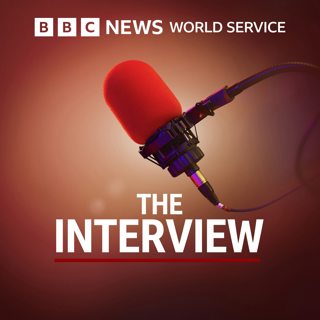
Surviving Syria’s sectarian violence
Tim Franks speaks to a British-Syrian Alawite who came under attack, along with her family, during the sectarian violence on Syria’s coast in March.The Alawite sect is an offshoot of Shia Islam and its followers make up around 10 per cent of Syria's population, which is majority Sunni.The recent violence came after fighters loyal to the country's overthrown former president, Bashar al-Assad, who is an Alawite himself, led deadly raids on the new government’s security forces.Those attacks resurrected deep-seated anger over Assad’s repressive dictatorship, with Alawite civilians seen by some as complicit in the crimes of his regime - and as part of the insurgency that followed his fall.The new Sunni Islamist-led government had called for support from various military units and militia groups to respond to the attacks on its security forces – which then escalated into a wave of sectarian anger aimed at Alawite civilians.Human rights groups estimate that around 900 civilians, mainly Alawites, were killed by pro-government forces across Syria's coastal region in early March.The Interview brings you conversations with people shaping our world, from all over the world. The best interviews from the BBC. You can listen on the BBC World Service, Mondays and Wednesdays at 0700 GMT. Or you can listen to The Interview as a podcast, out twice a week on BBC Sounds, or wherever you get your podcasts.Presenter: Tim Franks Producer: Ben Cooper Editor: Richard Fenton-Smith
25 Maj 22min
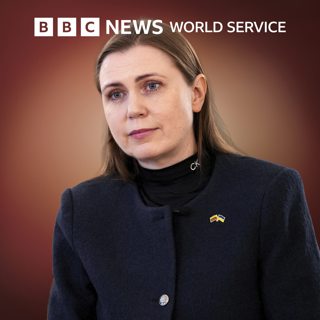
Dovilė Šakalienė, Defence Minister of Lithuania: Uncertain times for Europe
BBC Defence Correspondent Jonathan Beale speaks to Dovilė Šakalienė, Lithuania’s Defence Minister.The Baltic nation, along with its neighbours Latvia and Estonia, share a border with Russia, and have nervously watched the invasion of Ukraine, fearing they could be next.All three countries have had turbulent relationships with their much larger neighbour, Russia. They were annexed by the Soviet Union during the Second World War, and were subject to decades of rule from Moscow up until the end of the Cold War.In 2004, Lithuania joined both the European Union and Nato, and just over a decade later, adopted the Euro as its currency. But despite looking westwards, the country has always kept one eye on developments over its eastern border in Russia.Russia’s annexation of the Ukrainian region of Crimea in 2014 set off alarm bells in the Lithuanian capital Vilnius, and when the full-scale invasion of Ukraine by Russia began in 2022, Lithuania and its neighbours began fearing and preparing for the worst..Presenter: Jonathan Beale Producer: Ben Cooper Editor: Richard Fenton-Smith
20 Maj 22min
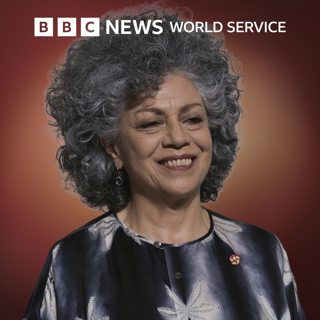
Doris Salcedo, Colombian artist - giving voice to victims of violence
In an interview from the BBC’s This Cultural Life, presenter John Wilson speaks to the Colombian artist Doris Salcedo. Her work is a response to the devastation of war, and tells the stories of its victims - tales of loss, trauma and survival. She is recognised as one of the most important living artists, and her powerful sculptures and installations have been shown across the world.A childhood growing up amid the political violence of Colombia led to career dedicated to giving voice to the victims of conflict, visiting concentration camps, mass graves and abandoned villages. She says she wants to place herself where there is nothing left but loss. The Interview brings you conversations with people shaping our world, from all over the world. The best interviews from the BBC. You can listen on the BBC World Service, Mondays and Wednesdays at 0700 GMT. Or you can listen to The Interview as a podcast, out twice a week on BBC Sounds, or wherever you get your podcasts.Presenter: John Wilson Producers: Lucy Sheppard, Ben Cooper Editor: Richard Fenton-SmithGet in touch with us on email TheInterview@bbc.co.uk and use the hashtag #TheInterviewBBC on social media.
18 Maj 22min
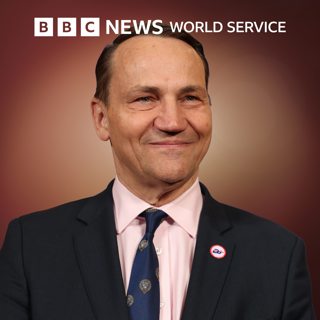
Radosław Sikorski, Foreign Minister of Poland: dealing with the growing threat from Russia
Kasia Madera speaks to Radosław Sikorski, the Foreign Minister of Poland.As a key, long-term ally to Ukraine, Poland has played a pivotal role in supporting its neighbour following the full-scale invasion by Russia in 2022.Mr Sikorski talks about the growing threat Poland, as well as Europe, faces from Russia, and follows his country’s decision to close the Russian consulate in Krakow.The move was made in response to a shopping centre fire in Warsaw last year, that Poland blames on Moscow. The Kremlin has dismissed the accusation as completely without foundation - it accuses Poland of hostility, and describes relations between the countries as deplorable.Mr Sikorski also gives his take on the prospect of a lasting ceasefire in Ukraine, the involvement of the US President Donald Trump, and the future of NATO.The Interview brings you conversations with people shaping our world, from all over the world. The best interviews from the BBC. You can listen on the BBC World Service, Mondays and Wednesdays at 0700 GMT. Or you can listen to The Interview as a podcast, out twice a week on BBC Sounds, or wherever you get your podcasts.Presenter: Kasia Madera Producers: Lucy Sheppard, Ben Cooper Editor: Emma RipponGet in touch with us on email TheInterview@bbc.co.uk and use the hashtag #TheInterviewBBC on social media.
13 Maj 22min
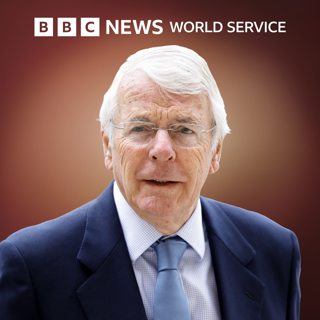
Sir John Major, former UK Prime Minister - are the lessons of WW2 being forgotten?
Nick Robinson speaks to Sir John Major, former Prime Minister of the United Kingdom.It’s 80 years since VE day marked the end of WW2 in Europe - and Sir John reflects on the lessons that should be remembered from the conflict. He is the last British Prime Minister who was alive during the Second World War. Sir John warns democracy should not be taken for granted, and is in retreat in some parts of the world - where tyranny is instead taking its place. He sets out his belief in fighting for the freedom of Ukraine, in a stronger Nato, and in a united Europe able to defend itself.The former prime minister also looks back at previous Victory in Europe days, and the moving ceremonies, moments and people that have stayed with him.The Interview brings you conversations with people shaping our world, from all over the world. The best interviews from the BBC. You can listen on the BBC World Service, Mondays and Wednesdays at 0700 GMT. Or you can listen to The Interview as a podcast, out twice a week on BBC Sounds, or wherever you get your podcasts.Presenter: Nick Robinson Producers: Ben Cooper, Lucy Sheppard Editor: Max DevesonGet in touch with us on email TheInterview@bbc.co.uk and use the hashtag #TheInterviewBBC on social media.
11 Maj 22min
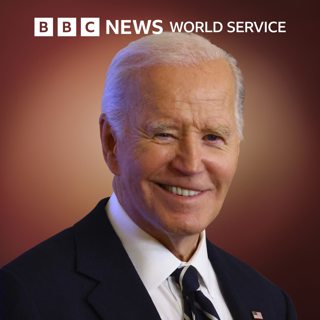
Joe Biden: Can the world still rely on America?
Nick Robinson, presenter of BBC Radio 4’s Today programme and the Political Thinking podcast, speaks to former US President, Joe Biden. The pair met in Biden’s home state of Delaware, in a hotel where he had launched his political career more than half a century ago.In his first interview since leaving the White House, Biden talks about democracy under threat, Ukraine and the future of NATO, and America’s place in the world - all at a time when we commemorate the 80th anniversary of VE, or Victory in Europe, Day. Biden himself was just a few years old at the end of the Second World War.He’ll also give his opinion on how his successor, President Trump, is faring so far in his second term. The Interview brings you conversations with people shaping our world, from all over the world. The best interviews from the BBC. You can listen on the BBC World Service, Mondays and Wednesdays at 0700 GMT. Or you can listen to The Interview as a podcast, out twice a week on BBC Sounds, or wherever you get your podcasts.Presenter: Nick Robinson Producers: Ben Cooper, Katie Solleveld Editor: Max DevesonGet in touch with us on email TheInterview@bbc.co.uk and use the hashtag #TheInterviewBBC on social media.
8 Maj 22min
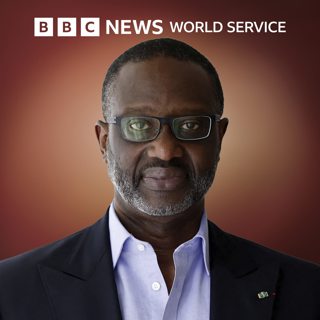
Tidjane Thiam, Ivory Coast opposition leader - can he run for president?
Catherine Byaruhanga, presenter and correspondent for the BBC News Channel, speaks to Tidjane Thiam, the main opposition leader in the Ivory Coast. Mr Thiam is a former CEO of Credit Suisse, with a lengthy and successful career in the financial sector abroad. Now, he wishes to stand for the Ivory Coast presidency - but his candidacy has been blocked by an Ivorian court. It has ruled he cannot run as he was not an Ivorian citizen when he registered on the electoral roll. Tidjane Thiam says the decision is politically motivated, a claim firmly rejected by the government of the Ivory Coast. But he is defending his right to run.Despite years of civil war since the turn of the century, Ivory Coast has a high level of income compared to its neighbours. But Mr Thiam believes more can be done to attract investment and to boost business - and that he has the financial expertise and contacts to make it happen.The Interview brings you conversations with people shaping our world, from all over the world. The best interviews from the BBC. You can listen on the BBC World Service, Mondays and Wednesdays at 0700 GMT. Or you can listen to The Interview as a podcast, out twice a week on BBC Sounds, or wherever you get your podcasts.Presenter: Catherine Byaruhanga Producers: Lucy Sheppard, Madeleine Drury Editor: Max DevesonGet in touch with us on email TheInterview@bbc.co.uk and use the hashtag #TheInterviewBBC on social media.
6 Maj 22min





















